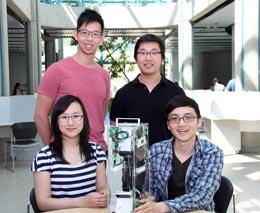SFU engineering students design screenless computer

By Leah Bjornson,
Special to The Post
A team of five SFU engineers are taking inspiration from the “big screen” with their latest project, aimed at freeing users from the bulky, fragile screens of modern devices.
The group has designed a screenless, mobile computer, dubbed the LumenX3. The LumenX3 is different from other mobile computers in that it projects a user interface onto any surface, making it infinitely versatile and protecting users who are nervous about damaging their devices’ often-fragile screens.
“It’s a new frontier in terms of how people use devices,” explained the team’s CEO, Gary Yu. “There is no screen, and yet it’s a full computer.”
“The projection is sensitive to touch, so users can tap, drag and interact with it as if it were a touch screen,” Yu continued.
The LumenX3 runs on Windows and uses PC applications, including things like Dropbox. In a demonstration, the students used the projection screen to drag and drop files on their desktop and even play touchscreen app-based games.
As the main component of their upper division engineering science course, the team, called ObelXTech, was given four months to propose, conceptualize, design, build, and demonstrate an engineering project of “some significance.”
In fact, ObeIXTech began working on their concept much earlier than this summer. “We actually came up with some ideas almost a year before the project due date and asked professors for their feedback, which was really helpful,” said team member Herman Mak.
The team settled on their projected screen concept after finding inspiration in the latest installment of the “Spider-Man” franchise. In the film, a futuristic machine projects a computing screen on a table.
“Movies always display cool devices that don’t exist yet,” explained Mike Ng, another student who worked on the LumenX3. “Because we were creating our own product, we thought: why not try to make something similar to what we’ve seen in the film?”
Having taken their idea from fiction to fruition, the team sees a market for the LumenX3 as an alternative to the tablet. Because it is so portable, presenters can easily bring it to meetings at venues and use it with any type of screen or flat surface.
The fact that the device is screenless also gives it an edge over smart devices whose screens crack easily.
The course supervisor, Andrew Rawicz, complimented the students on their innovation and determination. “I am particularly happy when our students are not intimidated by the challenge of ambitious projects, and this is the case of ObelXTech,” said Rawicz, who reviewed the projects with senior lecturer Steve Whitmore.
He continued, “As they say, sci-fi writers have futuristic ideas, and good engineers with a lot of imagination can make it real.”
The team members hope to continue to chart new frontiers in their future endeavours, which include PhD studies at Stanford, a co-op term with Amazon in Toronto, and a final semester at SFU before starting work at Microsoft.









